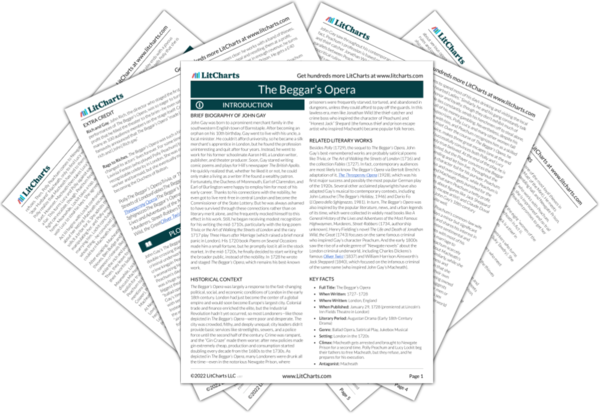Welcome to the LitCharts study guide on John Gay's The Beggar’s Opera. Created by the original team behind SparkNotes, LitCharts are the world's best literature guides.
The Beggar’s Opera: Introduction
The Beggar’s Opera: Plot Summary
The Beggar’s Opera: Detailed Summary & Analysis
The Beggar’s Opera: Themes
The Beggar’s Opera: Quotes
The Beggar’s Opera: Characters
The Beggar’s Opera: Terms
The Beggar’s Opera: Symbols
The Beggar’s Opera: Literary Devices
The Beggar’s Opera: Theme Wheel
Brief Biography of John Gay

Historical Context of The Beggar’s Opera
Other Books Related to The Beggar’s Opera
Key Facts about The Beggar’s Opera
- Full Title: The Beggar’s Opera
- When Written: 1727–1728
- Where Written: London, England
- When Published: January 29, 1728 (premiered at Lincoln’s Inn Fields Theatre in London)
- Literary Period: Augustan Drama (Early 18th-Century Drama)
- Genre: Ballad Opera, Satirical Play, Jukebox Musical
- Setting: London in the 1720s
- Climax: Macheath gets arrested and brought to Newgate Prison for a second time. Polly Peachum and Lucy Lockit beg their fathers to free Macheath, but they refuse, and he prepares for his execution.
- Antagonist: Macheath
Extra Credit for The Beggar’s Opera
Rich and Gay. John Rich, the director who staged the first performances of The Beggar’s Opera, was so eager to turn a profit that he filled the theater to the brim—he even sat as many as 100 audience members on the stage itself. Critics famously announced that The Beggar’s Opera “made [John] Gay rich and [John] Rich gay.”
Rags to Riches. The Beggar’s Opera was such a hit that it changed its actors’ lives forever. For some time, the actress Lavinia Fenton (who played Polly Peachum) became the most recognizable celebrity in London. She was once a child sex worker and barmaid, but she eventually married into nobility, becoming the Duchess of Bolton.
PollyThe Beggar’s OperaTrivia, or The Art of Walking the Streets of LondonFablesThe Beggar’s OperaThe Threepenny OperaThe Beggar’s HolidayL’Opera dello SghignazzoThe Beggar’s OperaA General History of the Lives and Adventures of the Most Famous Highwaymen, Murderers, Street-RobbersThe Life and Death of Jonathan Wild, the GreatOliver TwistJack Sheppard






